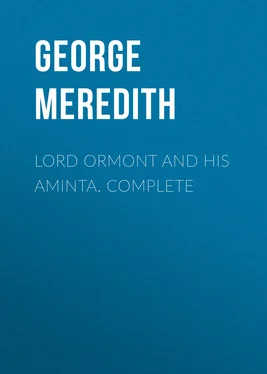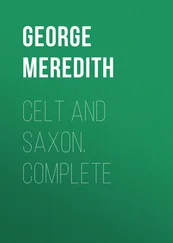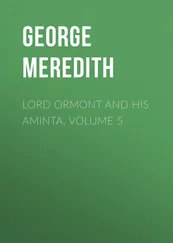George Meredith - Lord Ormont and His Aminta. Complete
Здесь есть возможность читать онлайн «George Meredith - Lord Ormont and His Aminta. Complete» — ознакомительный отрывок электронной книги совершенно бесплатно, а после прочтения отрывка купить полную версию. В некоторых случаях можно слушать аудио, скачать через торрент в формате fb2 и присутствует краткое содержание. Жанр: foreign_prose, literature_19, foreign_antique, на английском языке. Описание произведения, (предисловие) а так же отзывы посетителей доступны на портале библиотеки ЛибКат.
- Название:Lord Ormont and His Aminta. Complete
- Автор:
- Жанр:
- Год:неизвестен
- ISBN:нет данных
- Рейтинг книги:4 / 5. Голосов: 1
-
Избранное:Добавить в избранное
- Отзывы:
-
Ваша оценка:
- 80
- 1
- 2
- 3
- 4
- 5
Lord Ormont and His Aminta. Complete: краткое содержание, описание и аннотация
Предлагаем к чтению аннотацию, описание, краткое содержание или предисловие (зависит от того, что написал сам автор книги «Lord Ormont and His Aminta. Complete»). Если вы не нашли необходимую информацию о книге — напишите в комментариях, мы постараемся отыскать её.
Lord Ormont and His Aminta. Complete — читать онлайн ознакомительный отрывок
Ниже представлен текст книги, разбитый по страницам. Система сохранения места последней прочитанной страницы, позволяет с удобством читать онлайн бесплатно книгу «Lord Ormont and His Aminta. Complete», без необходимости каждый раз заново искать на чём Вы остановились. Поставьте закладку, и сможете в любой момент перейти на страницу, на которой закончили чтение.
Интервал:
Закладка:
“Unless a big war knocks over all rules and the country comes praying us to serve,” he said.
“You would not refuse then?”
“Not in case of need. One may imagine a crisis when they would give commissions to men of my age or older for the cavalry—heavy losses of officers.”
She spoke, as if urged by a sting to revert to the distasteful: “That profession—must you not take… enter into orders if you aim at any distinction?”
“And a member of the Anglican Church would not be allowed to exchange his frock for a cavalry sabre,” said he. “That is true. I do not propose to settle as a schoolmaster in England.”
“Where?”
“On the Continent.”
“Would not America be better?”
“It would not so well suit the purpose in view for us.”
“There are others besides?”
“Besides Emile, there is a German and an Italian and a Swiss.”
“It is a Company?”
“A Company of schoolmasters! Companies of all kinds are forming. Colleges are Companies. And they have their collegians. Our aim is at pupils; we have no ambition for any title higher than School and Schoolmaster; it is not a Company.”
So, like Nature parading her skeleton to youthful adorers of her face, he insisted on reducing to hideous material wreck the fair illusion, which had once arrayed him in alluring promise.
She explained; “I said, America. You would be among Protestants in America.”
“Catholics and Protestants are both welcome to us, according to our scheme. And Germans, French, English, Americans, Italians, if they will come; Spaniards and Portuguese, and Scandinavians, Russians as well. And Jews; Mahommedans too, if only they will come! The more mixed, the more it hits our object.”
“You have not stated where on the Continent it is to be.”
“The spot fixed on is in Switzerland.”
“You will have scenery.”
“I hold to that, as an influence.”
A cool vision of the Bernese Alps encircled the young schoolmaster; and she said, “It would influence girls; I dare say.”
“A harder matter with boys, of course—at first. We think we may make it serve.”
“And where is the spot? Is that fixed on?”
“Fifteen miles from Berne, on elevated land, neighbouring a water, not quite to be called a lake, unless in an auctioneer’s advertisement.”
“I am glad of the lake. I could not look on a country home where there was no swimming. You will be head of the school.”
“There must be a head.”
“Is the school likely to be established soon?”
He fell into her dead tone: “Money is required for establishments. I have a Reversion coming some day; I don’t dabble in post obits.”
He waited for farther questions. They were at an end.
“You have your work to do, Mr. Weyburn.”
Saying that, she bowed an implied apology for having kept him from it, and rose. She bowed again as she passed through the doorway, in acknowledgment of his politeness.
Here; then, was the end of the story of Browny and Matey. Such was his thought under the truncheon-stroke of their colloquy. Lines of Browny’s letters were fiery waving ribands about him, while the coldly gracious bow of the Lady wrote Finis.
The gulf between the two writings remained unsounded. It gave a heave to the old passion; but stirred no new one; he had himself in hand now, and he shut himself up when the questions bred of amazement buzzed and threatened to storm. After all, what is not curious in this world? The curious thing would be if curious things should fail to happen. Men have been saying it since they began to count and turn corners. And let us hold off from speculating when there is or but seems a shadow of unholiness over that mole-like business. There shall be no questions; and as to feelings, the same. They, if petted for a moment beneath the shadow, corrupt our blood. Weyburn was a man to have them by the throat at the birth.
Still they thronged; heavy work of strangling had to be done. Her tone of disappointment with the schoolmaster bit him, and it flattered him. The feelings leapt alive, equally venomous from the wound and the caress. They pushed to see, had to be repelled from seeing, the girl Browny in the splendid woman; they had lightning memories: not the pain of his grip could check their voice on the theme touching her happiness or the reverse. And this was an infernal cunning. He paused perforce to inquire, giving them space for the breeding of their multitudes. Was she happy? Did she not seem too meditative, enclosed, toneless, at her age? Vainly the persecuted fellow said to himself: “But what is it to me now?”—The Browny days were over. The passion for the younger Aminta was over—buried; and a dream of power belonging to those days was not yet more than visionary. It had moved her once, when it was a young soldier’s. She treated the schoolmaster’s dream as vapour, and the old days as dead and ghostless. She did rightly. How could they or she or he be other than they were!
With that sage exclamation, he headed into the Browny days and breasted them; and he had about him the living foamy sparkle of the very time, until the Countess of Ormont breathed the word “Schoolmaster”; when, at once, it was dusty land where buoyant waters had been, and the armies of the facts, in uniform drab, with some feathers and laces, and a significant surpliced figure, decorously covering the wildest of Cupids, marched the standard of the winking gold-piece, which is their nourishing sun and eclipser of all suns that foster dreams.
As you perceive, he was drawing swiftly to the vortex of the fools, and round and round he went, lucky to float.
His view of the business of the schoolmaster plucked him from the whirl. She despised it; he upheld it. He stuck to his view, finding their antagonism on the subject wholesome for him. All that she succeeded in doing was to rob it of the aurora colour clothing everything on which Matey Weyburn set his aim. Her contempt of it, whether as a profession in itself or as one suitable to the former young enthusiast for arms, dwarfed it to appear like the starved plants under Greenland skies. But those are of a sturdy genus; they mean to live; they live, perforce, of the right to live; they will prove their right in a coming season, when some one steps near and wonders at them, and from more closely observing; gets to understand, learning that the significance and the charm of earth will be as well shown by them as by her tropical fair flaunters or the tenderly-nurtured exotics.
An unopened coffer of things to be said in defence of—no, on behalf of—no, in honour of the Profession of Schoolmaster, perhaps to the convincing of Aminta, Lady Ormont, was glanced at; a sentence or two leapt out and stepped forward, and had to retire. He preferred to the fathering of tricky, windy phrases, the being undervalued—even by her. He was taught to see again how Rhetoric haunts, and Rhetoric bedevils, the vindication of the clouded, especially in the case of a disesteemed Profession requiring one to raise it and impose it upon the antagonistic senses for the bewildering of the mind. One has to sound it loudly; there is no treating it, as in the advocacy of the cases of flesh and blood, with the masterly pathos of designed simplicity. And Weyburn was Cuper’s Matey Weyburn still in his loathing of artifice to raise emotion, loathing of the affected, the stilted, the trumpet of speech—always excepting school-exercises in the tongues, the unmasking of a Catiline, the address of a General, Athenian or other, to troops.
He kept his coffer shut; and, for a consequence, he saw the contents as an avenue of blossom leading to vistas of infinite harvest.
She was Lady Ormont: Aminta shared the title of his old hero! He refused to speculate upon how it had come to pass, and let the curtain hang, though dramas and romances, with the miracles involved in them, were agitated by a transient glimpse at the curtain.
Читать дальшеИнтервал:
Закладка:
Похожие книги на «Lord Ormont and His Aminta. Complete»
Представляем Вашему вниманию похожие книги на «Lord Ormont and His Aminta. Complete» списком для выбора. Мы отобрали схожую по названию и смыслу литературу в надежде предоставить читателям больше вариантов отыскать новые, интересные, ещё непрочитанные произведения.
Обсуждение, отзывы о книге «Lord Ormont and His Aminta. Complete» и просто собственные мнения читателей. Оставьте ваши комментарии, напишите, что Вы думаете о произведении, его смысле или главных героях. Укажите что конкретно понравилось, а что нет, и почему Вы так считаете.












